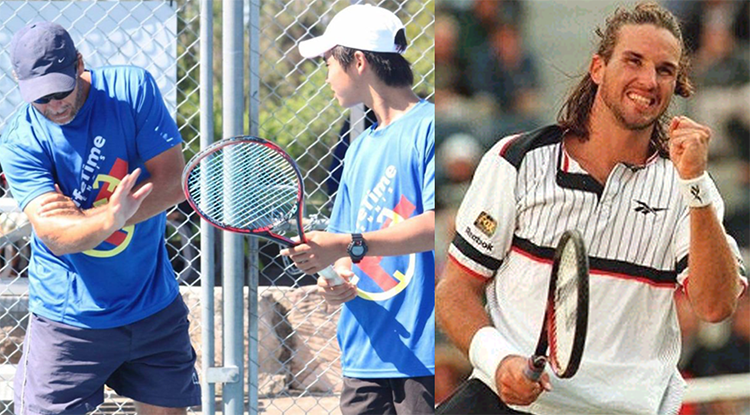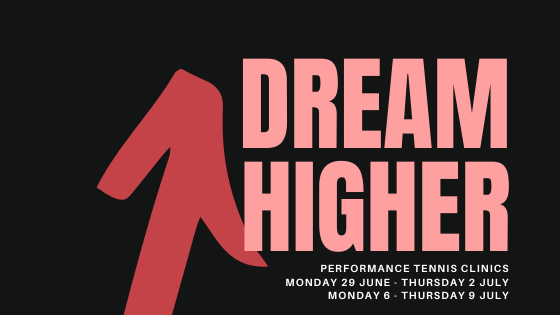Private Tennis Lessons VS Tennis Squads
Over the past year there has been a significant spike in parents and players wanting more and more private tennis lessons and after talking to parents and players about their reason I want to dispel a lot of the myths that surround an increased dependence that seems attached to having a “Private Tennis Coach”.
The first part of all this is that a private tennis coach is necessary in terms of setting the scene for what players should be doing over the rest of the week or short term. There should be a discussion and work done on the areas of a player’s game that they should be working on over the next few days/ weeks. This “Private Tennis Lesson” should be as much a goal setting session as it is an on court session and in fact if the coach didn’t hit a ball or stood on the court the value should be no less.
In that lies the problem. Some players and parents are not willing to take responsibility in their own development and work on areas of their games in the other times they are on court. This means that the only time a player is likely to improve is when a coach is on court with them. If a player is unable to work and improve independently it is unlikely they will ascend to a very high level of the game and at times when things get a little harder to improve ( which happens to every player) they are likely to take the easy option and give up. They have not invested in their own development. Here’s a phrase I used to use a lot when I was working with TA and its various subsidiaries.
AS A PLAYER YOU MUST BE AN ACTIVE PARTICIPATANT IN YOUR OWN DEVELOPMENT.
Meaning that Players who want to be successful and play at a high standard have to be significantly more invested in their development than what a coach or parent is.
Here’s some simple tests. Ask yourself the following.
When was the last time my child asked me to:
- Get to training early so he / she could warm up and prepare before going on court.
- Asked if they could go to the courts and hit some serves.
- Rang another player and asked for a hit.
- Organised some practice sets.
- Did extra physical work at home. Stretching / running / movement / strength
- Watched tennis matches on TV
- Stayed behind after losing in a tournament to “Watch” more matches.
- Wrote down or did an evaluation of their tennis goals
Now ask yourself where the motivation is?
If it is not with the player there is only 2 other possible motivations. Either the parent or the coach. It should be neither.
THIS NEEDS TO BE PLAYER DRIVEN.
Here’s a few other attitudes to be aware of.
Does your child ever come off from training:
- Down in the dumps, whinging, sooking, looking for attention because they have lost or not played well.
- Do you or your child put more importance on performance or on results?
- Do you or your child place the blame for a loss on opponent, coach, parent or other outside factors for that outcome?
- Are you or your child more focused on who they are playing or training against than performance?
- Does your child train / play unconditionally no matter what else may be going on outside of tennis or do you / they make excuses for their performance?
- Does your child ask you not to watch their matches?
- How often do you or your child cancel a tennis session for an extra – curricular school activity?
- As a parent do I send my child off to a coach or squad because the person or players in the squad motivate him or her?
- Does my child motivate the other players he or she is training with?
Ask your child 1 simple question. WHO DO YOU REALLY PLAY FOR? Be careful parents the answer may be a bit of a surprise. If the answer is themselves, does their actions meet their answer.
I’ve been coaching for 30 years and have working with a world number 1 and various other top 10, grand slam, Davis and Fed cup players and managed / coached a Junior Davis Cup Championship Team. As time goes by more and more tennis parents and players are turning to the coaches to perform some kind of magic on their tennis careers.
From my experience you are all looking in the wrong place. Players need to take a look in the mirror. As that is where the magic is. It lies within and what you as a player is prepared to do.
If you think private lessons are the most important part of your players program you are facilitating the very attitude that that gives your child less chance and not more of being successful in this game.
The squad lessons need to be the single most important sessions each player participates in throughout a week. They offer an opportunity to work on so much of what tennis is really all about. However, often parents and players prefer to miss squads in preference of privates. This attitude feeds the beast that will prevent the most important learning opportunities being, accountability and ownership of their own development.
If players would like to be success at this game from the age of 12 they will need to be on court for the majority 5 – 6 days a week.
A balanced on court tennis program will include all of the below.
- 1 Private tennis lesson per week (preferable bi weekly) and doesn’t have to be hitting.
- 3 Squad sessions per week.
- 1 – 2 hitting session per week. – with a player of a similar standard
- 1 – 2 set play match play session per week – with a player of a similar standard
These sessions that are self – directed and offer self – ownership are the sessions that players need the most. Develop independence and ownership in your players.
Tennis Parents stay out of it, do not get involved in those sessions. They are not your training sessions.
The first part of this is to understand where the feeling or need for private lessons are driven from. After speaking to a number of parents and coaches these seem to be the main points.
From a parents perspective the following were common messages:
- There seems to be the desire to receive personal tuition and more focused lesson with the players
- The players received more technical attention.
From a coaches point of view:
- Tennis Coaches generally love private tennis lessons because it fills up more on court time.
- To get over a technical hurdle that a player is struggling with
- Set the scene with players for the rest of the week
Think about this, if private lessons are so important why is it that the Tennis Australia National Academy programs consist almost entirely of squad lessons and they generally farm the private lessons back to the private enterprise coaches. If private lessons were so important why would they not want to do them themselves.
Over the past 30 years in the industry I can’t think back of a single successful player that I have worked with or seen working that has had a big focus on private lessons.
- 5 years at Tennis QLD and barely conducted a one on one lesson, all squads.
- 3 Years as AIS men’s coach and barely conducted a private lesson.
- 2 Years as NSWIS and TNSW Head coach and didn’t do a private lesson.
These programs have all produced world class tennis players and yet private lessons were an absolute rarity.
Our best players for as long back as I can think did very little one on one lessons with a coach. However the players who have been successful have been those who have been able to put the time in on court throughout their developing years. Read about squad sessions available here.
Parents I urge you to change your mind set in this space and look to balance out your child’s on court program.
Now the challenge is to get the children to be accountable by focussing on the things they are being asking to work on by the coach while they are not with a coach. When they start to do this then you may start to see where the magic really is.
From my point of view there are a range of benefits that squad session can give that private tennis lessons do not.
- The simple volume of work players can get in squad.
- Players can and should be working on their technic at all times which should be reinforced by the coaches in squads.
- Players get the opportunity to work on more tactical outcomes which drive the technic they use.
- Players generally have to be more aware (and are aligned to the match play) of the decision making process and the way in which they cope with different situations.
- There are much more live ball activities teaching a greater variety of options and choices available.
- There is in most cases more movement and physical activities involved in squad sessions.
- There is much more Serve and ROS activities involved in squads again creating a more realistic outcome.
When you ask your coach to do more sessions and he says you are better off doing more squads and more hitting, set play or serves and ROS he is really someone who cares about you. The coach that says let’s do a private lesson or another private lesson is probably someone who cares more about himself.
We get a heck of a lot of people coming along talking about wanting their kids to become better tennis players. I can understand them pulling out if they are sick or injured however the majority of our squad cancellations are now other extra – curricular activities that have nothing to do with tennis.
The frustration for us is that the attitude is that we want you to make our kids better but they don’t want to make a commitment to that. They want to pick and choose and do a portion of the work required and still get a great outcome. I’m here to say parents that is not going to happen.
Have a think about it from this perspective. Why do kids go to school 5 days a week 38 – 40 weeks of the year and 12 years to develop the skills required for university or to go into the workforce? Why do you think it is ok to look at tennis any different?
The MAGIC is in the dedication and discipline. They are the 2 most important personal qualities required to be successful. By the time your child is playing at a top 20 level in his or her age group in the state everyone playing at this level has talent. Talent WILL NOT be enough. What is going to give your child a COMPETITIVE ADVANTAGE from this point forward. I don’t think it exists in more private tennis lessons. What do you think?
Share this
You May Also Like
These Related Stories

Private Tennis Lessons Available

LifeTime Tennis Brisbane West named Tennis Australia National Talent Hub

